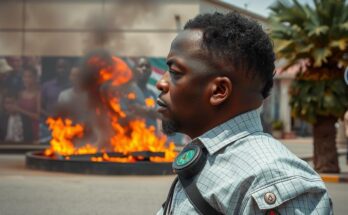The vice-presidential debate between JD Vance and Tim Walz focused on immigration, abortion rights, and international conflicts, displaying a largely civil atmosphere amidst some confrontations. Key moments included a muted microphone incident during immigration discussions and a shift in Vance’s position on abortion due to public sentiment. The debate marked a notable contrast to previous encounters, prioritizing substantive issues over personal disdain.
During the sole vice-presidential debate, JD Vance and Tim Walz intensely debated key issues such as international conflicts, the economy, immigration, and particularly abortion rights. Despite the potential for discord, the debate maintained a commendably civil tone, with instances of mutual agreement amidst some heated exchanges and a notable incident involving a muted microphone. Immigration, a significant concern for voters, dominated much of the discussion. Vance persistently related various topics back to the situation at the southern border, which many perceive as a Democratic weakness, while Walz countered Vance’s views by indicating that Trump had sabotaged bipartisan immigration reforms proposed under the Biden administration. The debate intensified when Vance made false claims concerning illegal immigration, leading to a moderator muting his microphone when he spoke over corrections. The backdrop of the debate included pressing global issues such as the recent missile attack on Israel by Iran, which weighed heavily on the candidates as they navigated their responses. Each candidate referenced their positions, with Walz showing nervousness, repeating assurances of support for Israel, while Vance echoed Trump’s assertion that no new international conflicts arose during the former president’s term. Another focal point was abortion rights, which prompted one of the most extended and impassioned dialogues of the evening. Walz leveraged anecdotes from women affected by stringent abortion laws, strongly portraying Trump as an obstruction to women’s rights due to Supreme Court appointments that dismantled protections formerly afforded by Roe v. Wade. Vance acknowledged a shift in his stance upon recognizing public sentiment towards abortion access in Ohio, suggesting a more moderate position than previously held. Walz addressed scrutiny regarding his past claim about being in Hong Kong during the Tiananmen Square massacre, admitting to having misspoken and referring to himself as a “knucklehead.” Vance, too, responded to prior contentious remarks, stating, “I was wrong about Donald Trump.” In contrast to the often caustic exchanges seen in debates between higher-profile candidates, this vice-presidential debate began with a handshake and proceeded with phases of politeness; the candidates consistently adhered to discussing matters at hand rather than resorting to personal criticisms, only directing comments towards the leading candidates when necessary. The dialogue did have minor sparks, particularly regarding the events of January 6, where Vance vigorously defended his support for Trump while Walz articulated a stark divergence in their viewpoints regarding election integrity. Overall, the debate was depicted as a refreshing change of pace within the election season, highlighting substantive discussions over interpersonal conflicts.
The vice-presidential debate serves as a crucial platform for candidates to express their viewpoints and engage with pressing national issues, particularly as the election approaches. This debate followed a period marked by partisan contention and aggressive discourse, making the comparatively civil tone of this encounter notable. With central topics such as immigration and abortion rights at the forefront, the candidates had opportunities to articulate their stances and respond to criticisms about their primary runs.
The debate illustrated critical distinctions between the candidates regarding immigration policies, abortion rights, and their respective commitments to their running mates. The civility demonstrated, despite some intense moments and interruptions, pointed towards a changing dynamic in political discourse, emphasizing issues over personal attacks.
Original Source: www.bbc.com




